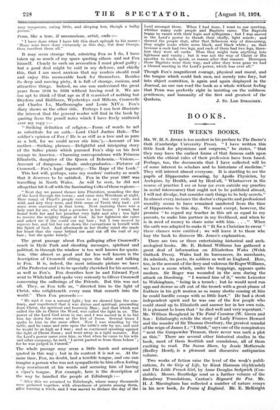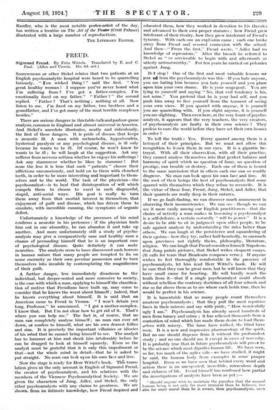BOOKS.
THIS WEEK'S BOOKS.
" When the oath was adapted to make it fit for a Christian to swear" these clauses were omitted ; we will leave it to those who buy the book to discover Mr. Jones's explanation.
There are two or three entertaining historical and arch- aeological books. Mr. E. Roland .Williams has gathered a great deal of information on Elizabethan Wales (Welsh Outlook Press). Wales had its buccaneers, its merchants, its admirals, its poets, its soldiers as well as England. Here, too, in the account of the fiery and valorous Sir Roger Williams, we have a scene which, under the trappings, appears quite modern. Sir Roger was wounded in' the arm during the attack on Doesburg. "I warned him 'of it," wrote Leicester to Walsingham, "being in a trench ; but he would need run upp and downe so oft out of the trench with a great plume of feathers in his gylt morion as so Many shotte -coming at him he could haidlie escape. with sos little hurt" He had a stout independent spirit and he Was one of the few people who could stand up to Eliiabeth and answer her in her- own coin, It is pleasant to learn that " he died well and very repentant." Mr. William Roughead in The Filial Countess (W. Green and Son : Edinburgh) retells the story of Lady Frances Howard and the murder of Sir Thomas Oyerbury, the greatest scandal of the reign of James I.; "I think," says One of the conspirators "next the Gunpowder Trea.sini, there never was such a plot as this." there are several other historical studies in the hook, most of them Scottish and scandalous, all of them exciting to read. The Saxon Shore, by Jessie Mothersole (BOdley Head), is a pleasant and discursive antiquarian volume.
Two works of fiction raise the level of the week's publi- cations, In the Grip of Life, by knut Hamsun (Cyldendal) and The Little French Girl, by Anne Douglas Sedgwieli (Con- stable). Messrs. Routledge send us a further volume of the Broadway Translations, Caxton's Iieynitrd the Fox. Mr. H. J. Massingham has collected. a number Of nature essays in his new book, In Praise of England,' Mi. E. McKnight Mn. W. H. S. JONES is too modest in his preface to The Doctor's Oath (Cambridge University Press). "I have written this little book for physicians and surgeons," he states, " that they may have the earliest forms of that famous oath upon which the ethical rules of their profession have been based. Perhaps, too, the documents that I have collected will be of some interest to scholars and to historians of medicine." They will interest almost everyone. It is startling to see the ,pupils of Hippocrates swearing, by Apollo Physician, by Asclepius, by Health, and by Heal-all, "Whatsoever in the course of practice I see or hear (or even outside my practice in social intercourse) that ought not to be published abroad, I will not divulge, but consider such things to be holy secrets." In almost every instance the doctor's etiquette and professional morality seems to have remained unaltered from the time of Hippocrates to this, day. We must except, however, the promise "to regard my teacher in this art as equal to my parents, to make him partner in my livelihood, and when he is in need of money to share mine with him Kauffer, who is the ,most notable poster-artist of the day, has written a treatise on The Art of the Poaler (Cecil Palmer) illustrated with a large number of reproductions.
THE LITERARY EDITOR.



































 Previous page
Previous page